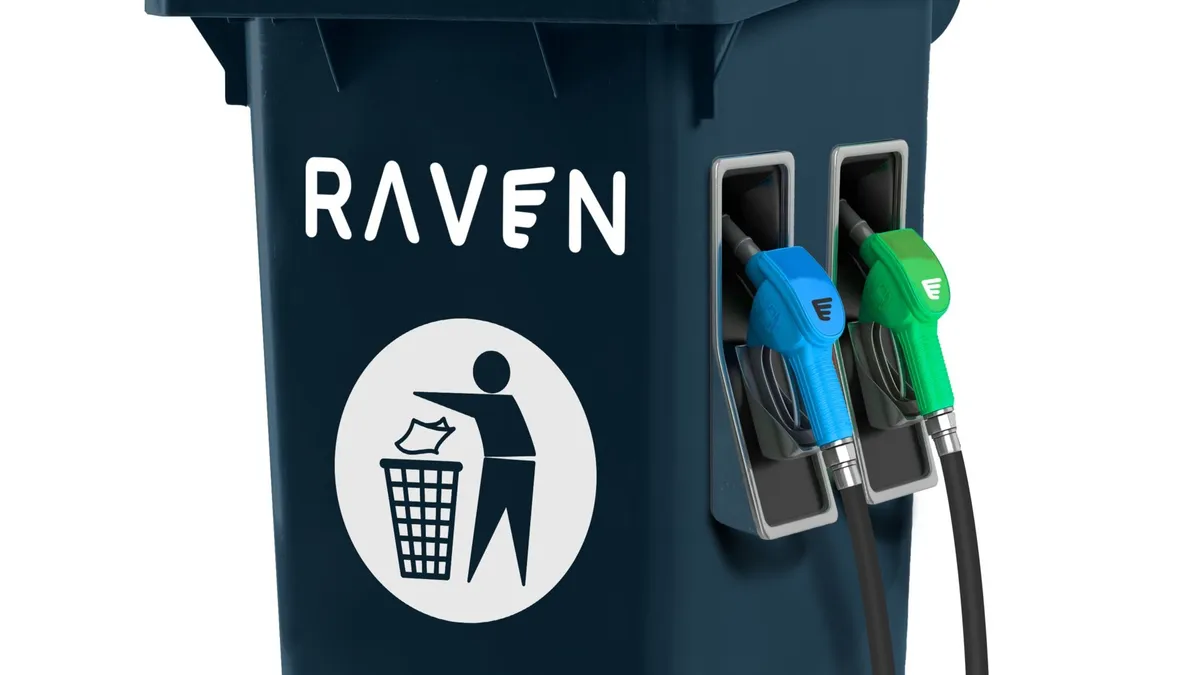Dive Brief:
- Waste company Republic Services last month announced an arrangement with renewable-fuels company Raven SR to produce up to 2,000 metric tons per year of green hydrogen, which it plans to sell to truck manufacturer Hyzon and commercial fueling stations.
- Raven is coming off a $20 million investment, with backers including Chevron and Hyzon. It previously announced plans to build up to 250 hydrogen hubs with Hyzon, starting with the processing site with Republic Services in Richmond, California, and another in the state that has yet to be named.
- Raven founder and CEO Matt Murdock said the two California sites could produce enough hydrogen to power an estimated 200 heavy-duty trucks per day.
Dive Insight:
Transportation is a fast-growing investment area for hydrogen, said Noah Kaye, a senior research analyst at Oppenheimer & Co.
Trucking's "strong energy density" provides notable range benefits for long-haul, heavy-duty fleets, Kaye said. Hydrogen fuel cells are also considered attractive because they offer quicker fueling times than other diesel alternatives.
Cummins hosted an investor day about hydrogen vehicles last fall, and Toyota, Hyundai and Nikola have also been pursuing hydrogen-fuel-cell electric vehicles.
Hyzon recently began trading on the Nasdaq Global Select Market. While Europe is the original equipment manufacturer's current focus for rolling out trucks, it is preparing for demonstrations in the U.S. during Q4 and Q1 next year.
"In the second half of 2022, we really expect some substantial uptake in the U.S. market," CEO Craig Knight said in July.
One challenge with electric vehicles is associated costs for stakeholders across the supply chain. Raven uses a hydrogen-production system that currently costs more than steam-methane reforming, which is the primary method for hydrogen production.
Raven's system can handle a range of waste streams, as well as landfill gas that would otherwise be flared, which the company describes as being greener than steam-methane reforming. And Murdock said he expects that will change once the technology scales up.
His goal is for this to be cost-competitive without policy drivers, citing Texas as a market he'd like to break into, and to be adaptable to a range of financial arrangements.
Given the waste and recycling industry's track record of investing in alternative fuel options, such as natural gas and battery electric vehicles, Kaye said this could be a future area of interest for the industry. Companies such as Ballard Power have called out the potential for hydrogen fuel cells in refuse collection and Glasgow, Scotland, recently placed what may be the largest order of such vehicles to date.
"There’s certainly potential in the waste industry for a closed-loop production system in hydrogen, using [municipal solid waste-derived] methane to produce hydrogen that then goes into fleets," said Kaye. "The development of that ecosystem is nascent, but we’ll be excited to learn more about the economics of this project and its potential for replication elsewhere."
Republic touts its involvement in 75 "renewable energy" projects and is bullish on battery-electric vehicles, but it may not be the first to make a move on hydrogen fuel cells.
"If hydrogen is going to take off, it’s going to take off in California first," said Keller. "We don’t think fuel cells are the right application for our industry. Fuel cells probably have a role in over-the-road applications."
Knight said Hyzon is targeting regional hauls for its hydrogen trucks. He said his company has heard that fleets that have tried BEVs in beverage transport and refuse collection, and in reefer and cold-chain logistics have run up against range and power limitations.
But those types of hauls "are a slam dunk for hydrogen," Knight said.
S.L. Fuller contributed to this report.
















